SDN and PBM: A Comparative Analysis for Network Management
VerifiedAdded on 2023/06/11
|8
|1928
|100
AI Summary
This article provides a detailed analysis of Software Defined Networking (SDN) and Policy-Based Network Management (PBM) approaches to network management. It describes the benefits of each approach, their infrastructure requirements, and the type of services offered. The article also provides a recommendation for which approach is most suitable for the organization in the case study. The analysis is based on research and expert opinions from academic sources.
Contribute Materials
Your contribution can guide someone’s learning journey. Share your
documents today.

DISTRIBUTED SYSTEMS ASSIGNMENT 1
Distributed Systems Assignment
Student’s Name
Institutional Affiliation
Date
Distributed Systems Assignment
Student’s Name
Institutional Affiliation
Date
Secure Best Marks with AI Grader
Need help grading? Try our AI Grader for instant feedback on your assignments.
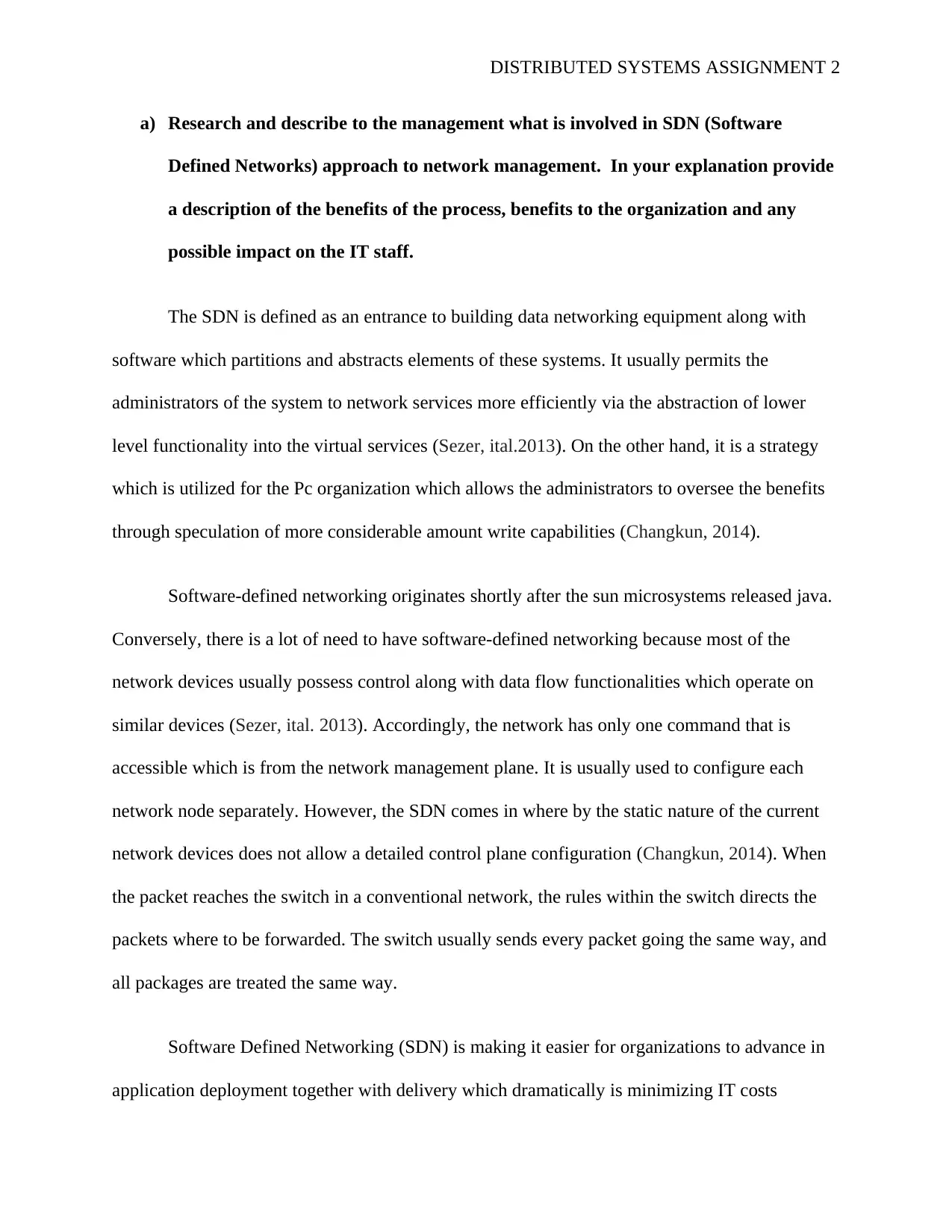
DISTRIBUTED SYSTEMS ASSIGNMENT 2
a) Research and describe to the management what is involved in SDN (Software
Defined Networks) approach to network management. In your explanation provide
a description of the benefits of the process, benefits to the organization and any
possible impact on the IT staff.
The SDN is defined as an entrance to building data networking equipment along with
software which partitions and abstracts elements of these systems. It usually permits the
administrators of the system to network services more efficiently via the abstraction of lower
level functionality into the virtual services (Sezer, ital.2013). On the other hand, it is a strategy
which is utilized for the Pc organization which allows the administrators to oversee the benefits
through speculation of more considerable amount write capabilities (Changkun, 2014).
Software-defined networking originates shortly after the sun microsystems released java.
Conversely, there is a lot of need to have software-defined networking because most of the
network devices usually possess control along with data flow functionalities which operate on
similar devices (Sezer, ital. 2013). Accordingly, the network has only one command that is
accessible which is from the network management plane. It is usually used to configure each
network node separately. However, the SDN comes in where by the static nature of the current
network devices does not allow a detailed control plane configuration (Changkun, 2014). When
the packet reaches the switch in a conventional network, the rules within the switch directs the
packets where to be forwarded. The switch usually sends every packet going the same way, and
all packages are treated the same way.
Software Defined Networking (SDN) is making it easier for organizations to advance in
application deployment together with delivery which dramatically is minimizing IT costs
a) Research and describe to the management what is involved in SDN (Software
Defined Networks) approach to network management. In your explanation provide
a description of the benefits of the process, benefits to the organization and any
possible impact on the IT staff.
The SDN is defined as an entrance to building data networking equipment along with
software which partitions and abstracts elements of these systems. It usually permits the
administrators of the system to network services more efficiently via the abstraction of lower
level functionality into the virtual services (Sezer, ital.2013). On the other hand, it is a strategy
which is utilized for the Pc organization which allows the administrators to oversee the benefits
through speculation of more considerable amount write capabilities (Changkun, 2014).
Software-defined networking originates shortly after the sun microsystems released java.
Conversely, there is a lot of need to have software-defined networking because most of the
network devices usually possess control along with data flow functionalities which operate on
similar devices (Sezer, ital. 2013). Accordingly, the network has only one command that is
accessible which is from the network management plane. It is usually used to configure each
network node separately. However, the SDN comes in where by the static nature of the current
network devices does not allow a detailed control plane configuration (Changkun, 2014). When
the packet reaches the switch in a conventional network, the rules within the switch directs the
packets where to be forwarded. The switch usually sends every packet going the same way, and
all packages are treated the same way.
Software Defined Networking (SDN) is making it easier for organizations to advance in
application deployment together with delivery which dramatically is minimizing IT costs
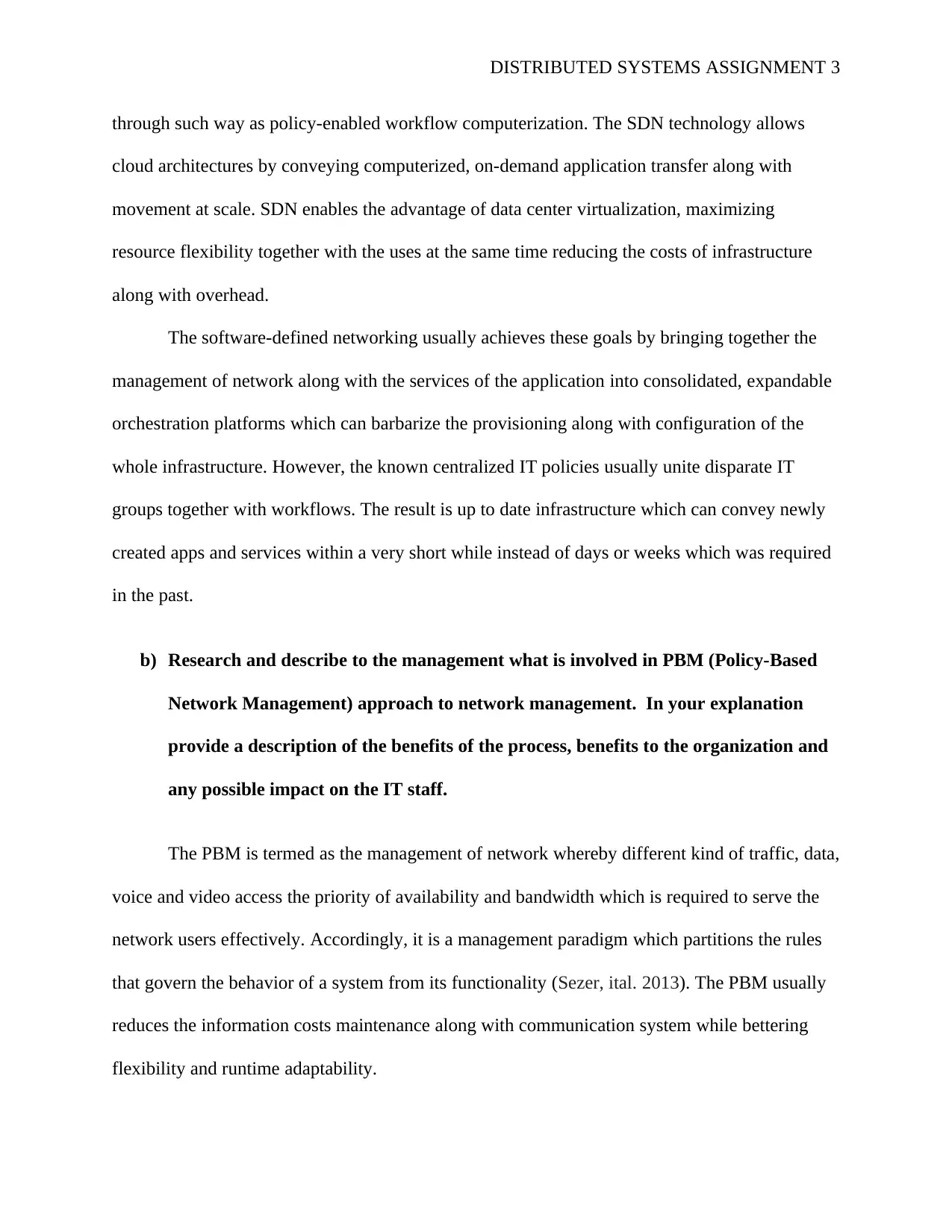
DISTRIBUTED SYSTEMS ASSIGNMENT 3
through such way as policy-enabled workflow computerization. The SDN technology allows
cloud architectures by conveying computerized, on-demand application transfer along with
movement at scale. SDN enables the advantage of data center virtualization, maximizing
resource flexibility together with the uses at the same time reducing the costs of infrastructure
along with overhead.
The software-defined networking usually achieves these goals by bringing together the
management of network along with the services of the application into consolidated, expandable
orchestration platforms which can barbarize the provisioning along with configuration of the
whole infrastructure. However, the known centralized IT policies usually unite disparate IT
groups together with workflows. The result is up to date infrastructure which can convey newly
created apps and services within a very short while instead of days or weeks which was required
in the past.
b) Research and describe to the management what is involved in PBM (Policy-Based
Network Management) approach to network management. In your explanation
provide a description of the benefits of the process, benefits to the organization and
any possible impact on the IT staff.
The PBM is termed as the management of network whereby different kind of traffic, data,
voice and video access the priority of availability and bandwidth which is required to serve the
network users effectively. Accordingly, it is a management paradigm which partitions the rules
that govern the behavior of a system from its functionality (Sezer, ital. 2013). The PBM usually
reduces the information costs maintenance along with communication system while bettering
flexibility and runtime adaptability.
through such way as policy-enabled workflow computerization. The SDN technology allows
cloud architectures by conveying computerized, on-demand application transfer along with
movement at scale. SDN enables the advantage of data center virtualization, maximizing
resource flexibility together with the uses at the same time reducing the costs of infrastructure
along with overhead.
The software-defined networking usually achieves these goals by bringing together the
management of network along with the services of the application into consolidated, expandable
orchestration platforms which can barbarize the provisioning along with configuration of the
whole infrastructure. However, the known centralized IT policies usually unite disparate IT
groups together with workflows. The result is up to date infrastructure which can convey newly
created apps and services within a very short while instead of days or weeks which was required
in the past.
b) Research and describe to the management what is involved in PBM (Policy-Based
Network Management) approach to network management. In your explanation
provide a description of the benefits of the process, benefits to the organization and
any possible impact on the IT staff.
The PBM is termed as the management of network whereby different kind of traffic, data,
voice and video access the priority of availability and bandwidth which is required to serve the
network users effectively. Accordingly, it is a management paradigm which partitions the rules
that govern the behavior of a system from its functionality (Sezer, ital. 2013). The PBM usually
reduces the information costs maintenance along with communication system while bettering
flexibility and runtime adaptability.
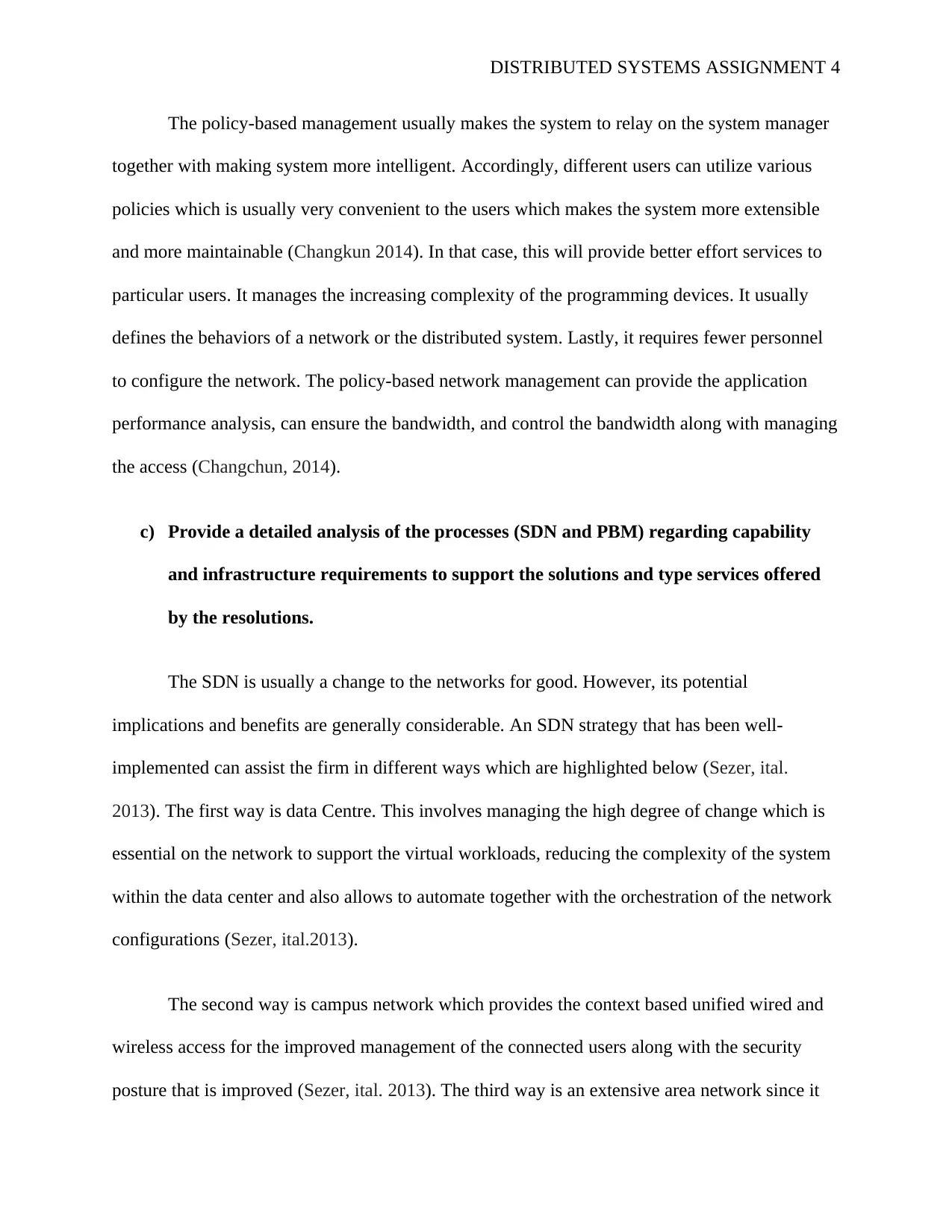
DISTRIBUTED SYSTEMS ASSIGNMENT 4
The policy-based management usually makes the system to relay on the system manager
together with making system more intelligent. Accordingly, different users can utilize various
policies which is usually very convenient to the users which makes the system more extensible
and more maintainable (Changkun 2014). In that case, this will provide better effort services to
particular users. It manages the increasing complexity of the programming devices. It usually
defines the behaviors of a network or the distributed system. Lastly, it requires fewer personnel
to configure the network. The policy-based network management can provide the application
performance analysis, can ensure the bandwidth, and control the bandwidth along with managing
the access (Changchun, 2014).
c) Provide a detailed analysis of the processes (SDN and PBM) regarding capability
and infrastructure requirements to support the solutions and type services offered
by the resolutions.
The SDN is usually a change to the networks for good. However, its potential
implications and benefits are generally considerable. An SDN strategy that has been well-
implemented can assist the firm in different ways which are highlighted below (Sezer, ital.
2013). The first way is data Centre. This involves managing the high degree of change which is
essential on the network to support the virtual workloads, reducing the complexity of the system
within the data center and also allows to automate together with the orchestration of the network
configurations (Sezer, ital.2013).
The second way is campus network which provides the context based unified wired and
wireless access for the improved management of the connected users along with the security
posture that is improved (Sezer, ital. 2013). The third way is an extensive area network since it
The policy-based management usually makes the system to relay on the system manager
together with making system more intelligent. Accordingly, different users can utilize various
policies which is usually very convenient to the users which makes the system more extensible
and more maintainable (Changkun 2014). In that case, this will provide better effort services to
particular users. It manages the increasing complexity of the programming devices. It usually
defines the behaviors of a network or the distributed system. Lastly, it requires fewer personnel
to configure the network. The policy-based network management can provide the application
performance analysis, can ensure the bandwidth, and control the bandwidth along with managing
the access (Changchun, 2014).
c) Provide a detailed analysis of the processes (SDN and PBM) regarding capability
and infrastructure requirements to support the solutions and type services offered
by the resolutions.
The SDN is usually a change to the networks for good. However, its potential
implications and benefits are generally considerable. An SDN strategy that has been well-
implemented can assist the firm in different ways which are highlighted below (Sezer, ital.
2013). The first way is data Centre. This involves managing the high degree of change which is
essential on the network to support the virtual workloads, reducing the complexity of the system
within the data center and also allows to automate together with the orchestration of the network
configurations (Sezer, ital.2013).
The second way is campus network which provides the context based unified wired and
wireless access for the improved management of the connected users along with the security
posture that is improved (Sezer, ital. 2013). The third way is an extensive area network since it
Secure Best Marks with AI Grader
Need help grading? Try our AI Grader for instant feedback on your assignments.
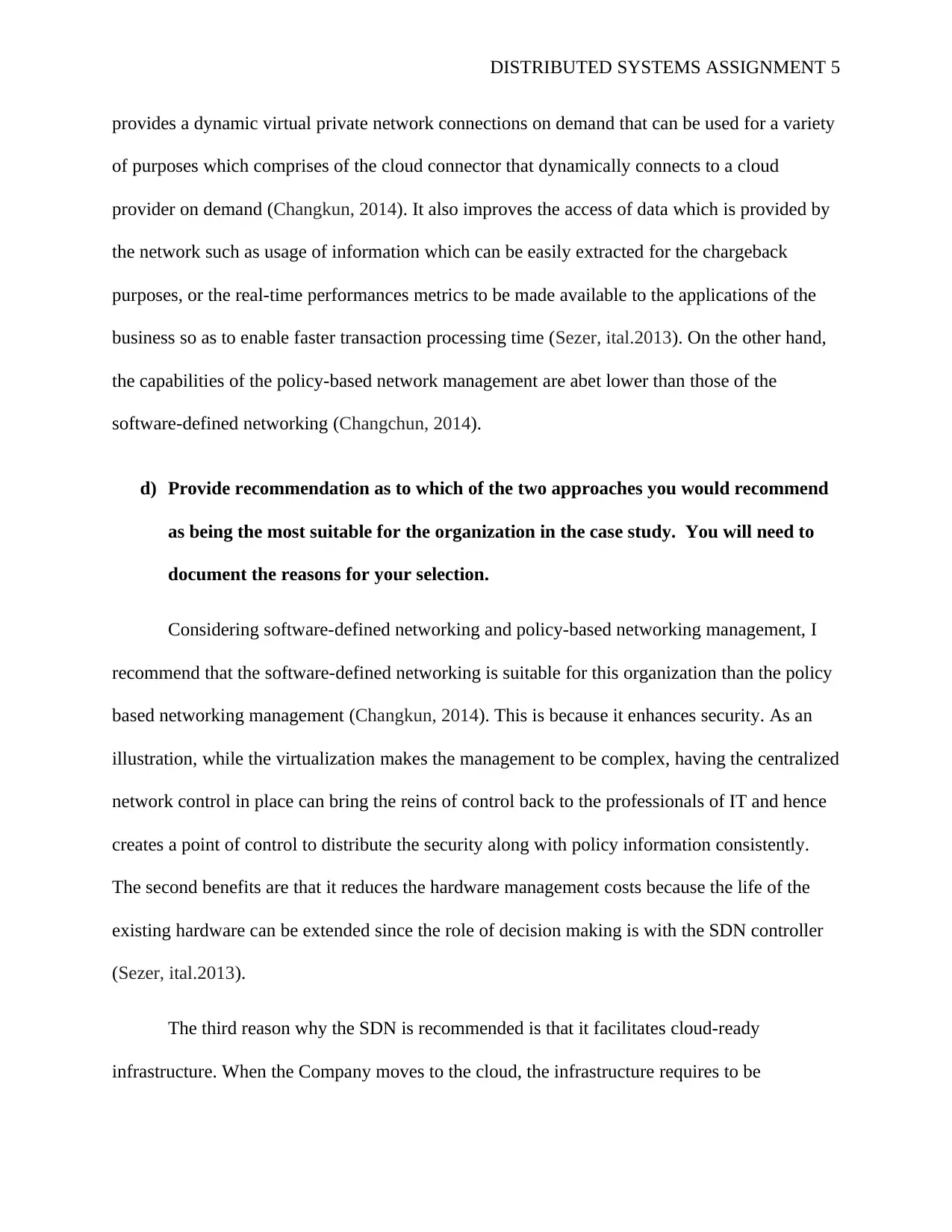
DISTRIBUTED SYSTEMS ASSIGNMENT 5
provides a dynamic virtual private network connections on demand that can be used for a variety
of purposes which comprises of the cloud connector that dynamically connects to a cloud
provider on demand (Changkun, 2014). It also improves the access of data which is provided by
the network such as usage of information which can be easily extracted for the chargeback
purposes, or the real-time performances metrics to be made available to the applications of the
business so as to enable faster transaction processing time (Sezer, ital.2013). On the other hand,
the capabilities of the policy-based network management are abet lower than those of the
software-defined networking (Changchun, 2014).
d) Provide recommendation as to which of the two approaches you would recommend
as being the most suitable for the organization in the case study. You will need to
document the reasons for your selection.
Considering software-defined networking and policy-based networking management, I
recommend that the software-defined networking is suitable for this organization than the policy
based networking management (Changkun, 2014). This is because it enhances security. As an
illustration, while the virtualization makes the management to be complex, having the centralized
network control in place can bring the reins of control back to the professionals of IT and hence
creates a point of control to distribute the security along with policy information consistently.
The second benefits are that it reduces the hardware management costs because the life of the
existing hardware can be extended since the role of decision making is with the SDN controller
(Sezer, ital.2013).
The third reason why the SDN is recommended is that it facilitates cloud-ready
infrastructure. When the Company moves to the cloud, the infrastructure requires to be
provides a dynamic virtual private network connections on demand that can be used for a variety
of purposes which comprises of the cloud connector that dynamically connects to a cloud
provider on demand (Changkun, 2014). It also improves the access of data which is provided by
the network such as usage of information which can be easily extracted for the chargeback
purposes, or the real-time performances metrics to be made available to the applications of the
business so as to enable faster transaction processing time (Sezer, ital.2013). On the other hand,
the capabilities of the policy-based network management are abet lower than those of the
software-defined networking (Changchun, 2014).
d) Provide recommendation as to which of the two approaches you would recommend
as being the most suitable for the organization in the case study. You will need to
document the reasons for your selection.
Considering software-defined networking and policy-based networking management, I
recommend that the software-defined networking is suitable for this organization than the policy
based networking management (Changkun, 2014). This is because it enhances security. As an
illustration, while the virtualization makes the management to be complex, having the centralized
network control in place can bring the reins of control back to the professionals of IT and hence
creates a point of control to distribute the security along with policy information consistently.
The second benefits are that it reduces the hardware management costs because the life of the
existing hardware can be extended since the role of decision making is with the SDN controller
(Sezer, ital.2013).
The third reason why the SDN is recommended is that it facilitates cloud-ready
infrastructure. When the Company moves to the cloud, the infrastructure requires to be
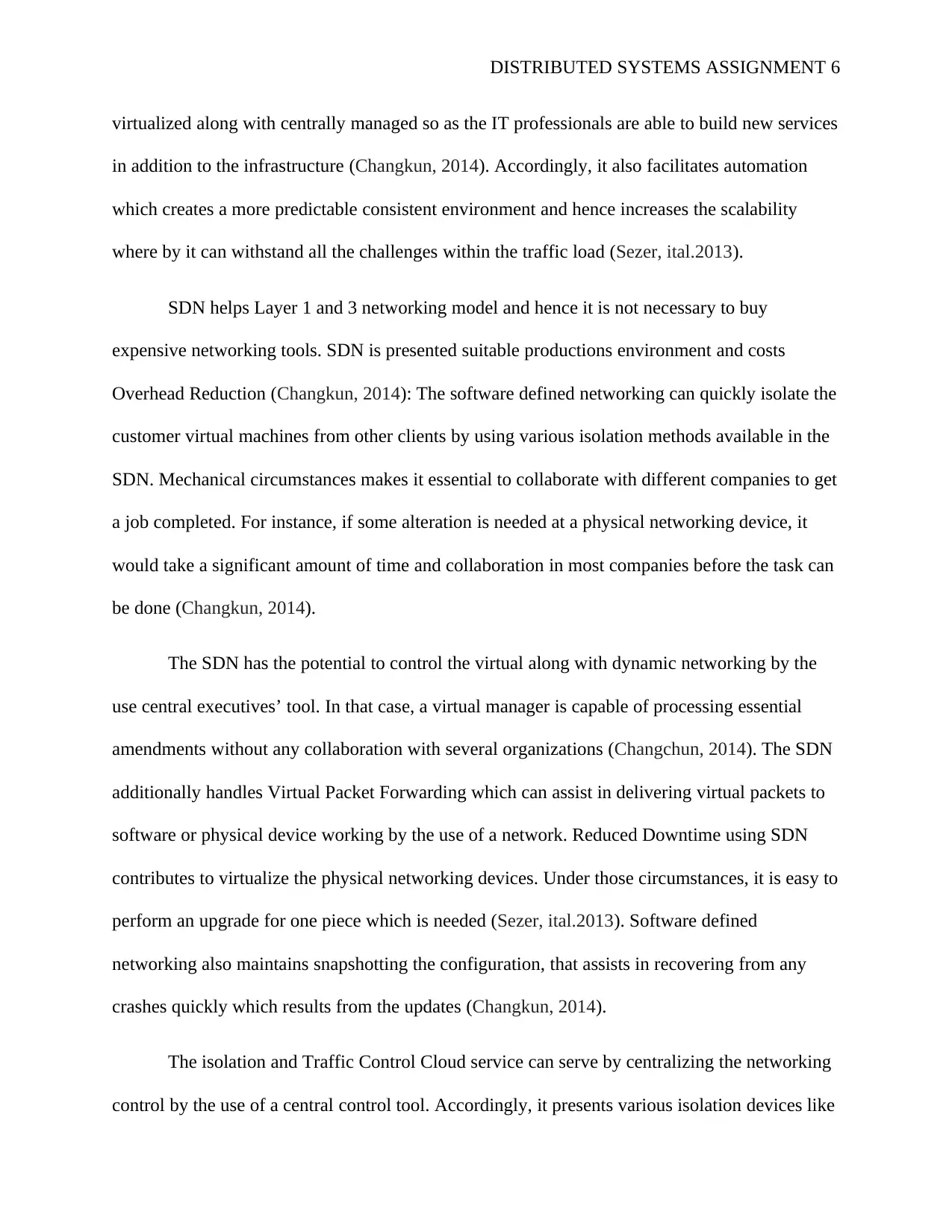
DISTRIBUTED SYSTEMS ASSIGNMENT 6
virtualized along with centrally managed so as the IT professionals are able to build new services
in addition to the infrastructure (Changkun, 2014). Accordingly, it also facilitates automation
which creates a more predictable consistent environment and hence increases the scalability
where by it can withstand all the challenges within the traffic load (Sezer, ital.2013).
SDN helps Layer 1 and 3 networking model and hence it is not necessary to buy
expensive networking tools. SDN is presented suitable productions environment and costs
Overhead Reduction (Changkun, 2014): The software defined networking can quickly isolate the
customer virtual machines from other clients by using various isolation methods available in the
SDN. Mechanical circumstances makes it essential to collaborate with different companies to get
a job completed. For instance, if some alteration is needed at a physical networking device, it
would take a significant amount of time and collaboration in most companies before the task can
be done (Changkun, 2014).
The SDN has the potential to control the virtual along with dynamic networking by the
use central executives’ tool. In that case, a virtual manager is capable of processing essential
amendments without any collaboration with several organizations (Changchun, 2014). The SDN
additionally handles Virtual Packet Forwarding which can assist in delivering virtual packets to
software or physical device working by the use of a network. Reduced Downtime using SDN
contributes to virtualize the physical networking devices. Under those circumstances, it is easy to
perform an upgrade for one piece which is needed (Sezer, ital.2013). Software defined
networking also maintains snapshotting the configuration, that assists in recovering from any
crashes quickly which results from the updates (Changkun, 2014).
The isolation and Traffic Control Cloud service can serve by centralizing the networking
control by the use of a central control tool. Accordingly, it presents various isolation devices like
virtualized along with centrally managed so as the IT professionals are able to build new services
in addition to the infrastructure (Changkun, 2014). Accordingly, it also facilitates automation
which creates a more predictable consistent environment and hence increases the scalability
where by it can withstand all the challenges within the traffic load (Sezer, ital.2013).
SDN helps Layer 1 and 3 networking model and hence it is not necessary to buy
expensive networking tools. SDN is presented suitable productions environment and costs
Overhead Reduction (Changkun, 2014): The software defined networking can quickly isolate the
customer virtual machines from other clients by using various isolation methods available in the
SDN. Mechanical circumstances makes it essential to collaborate with different companies to get
a job completed. For instance, if some alteration is needed at a physical networking device, it
would take a significant amount of time and collaboration in most companies before the task can
be done (Changkun, 2014).
The SDN has the potential to control the virtual along with dynamic networking by the
use central executives’ tool. In that case, a virtual manager is capable of processing essential
amendments without any collaboration with several organizations (Changchun, 2014). The SDN
additionally handles Virtual Packet Forwarding which can assist in delivering virtual packets to
software or physical device working by the use of a network. Reduced Downtime using SDN
contributes to virtualize the physical networking devices. Under those circumstances, it is easy to
perform an upgrade for one piece which is needed (Sezer, ital.2013). Software defined
networking also maintains snapshotting the configuration, that assists in recovering from any
crashes quickly which results from the updates (Changkun, 2014).
The isolation and Traffic Control Cloud service can serve by centralizing the networking
control by the use of a central control tool. Accordingly, it presents various isolation devices like
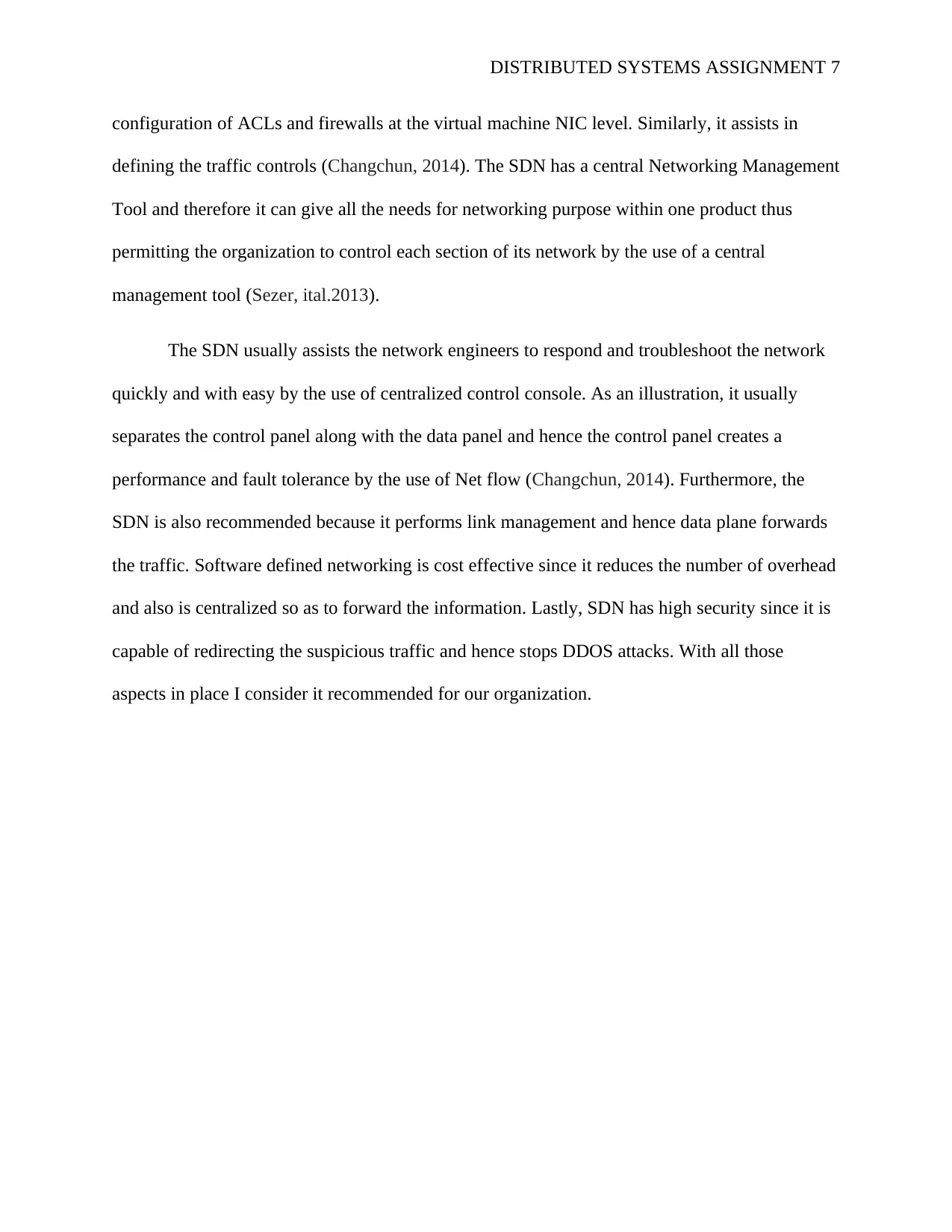
DISTRIBUTED SYSTEMS ASSIGNMENT 7
configuration of ACLs and firewalls at the virtual machine NIC level. Similarly, it assists in
defining the traffic controls (Changchun, 2014). The SDN has a central Networking Management
Tool and therefore it can give all the needs for networking purpose within one product thus
permitting the organization to control each section of its network by the use of a central
management tool (Sezer, ital.2013).
The SDN usually assists the network engineers to respond and troubleshoot the network
quickly and with easy by the use of centralized control console. As an illustration, it usually
separates the control panel along with the data panel and hence the control panel creates a
performance and fault tolerance by the use of Net flow (Changchun, 2014). Furthermore, the
SDN is also recommended because it performs link management and hence data plane forwards
the traffic. Software defined networking is cost effective since it reduces the number of overhead
and also is centralized so as to forward the information. Lastly, SDN has high security since it is
capable of redirecting the suspicious traffic and hence stops DDOS attacks. With all those
aspects in place I consider it recommended for our organization.
configuration of ACLs and firewalls at the virtual machine NIC level. Similarly, it assists in
defining the traffic controls (Changchun, 2014). The SDN has a central Networking Management
Tool and therefore it can give all the needs for networking purpose within one product thus
permitting the organization to control each section of its network by the use of a central
management tool (Sezer, ital.2013).
The SDN usually assists the network engineers to respond and troubleshoot the network
quickly and with easy by the use of centralized control console. As an illustration, it usually
separates the control panel along with the data panel and hence the control panel creates a
performance and fault tolerance by the use of Net flow (Changchun, 2014). Furthermore, the
SDN is also recommended because it performs link management and hence data plane forwards
the traffic. Software defined networking is cost effective since it reduces the number of overhead
and also is centralized so as to forward the information. Lastly, SDN has high security since it is
capable of redirecting the suspicious traffic and hence stops DDOS attacks. With all those
aspects in place I consider it recommended for our organization.
Paraphrase This Document
Need a fresh take? Get an instant paraphrase of this document with our AI Paraphraser
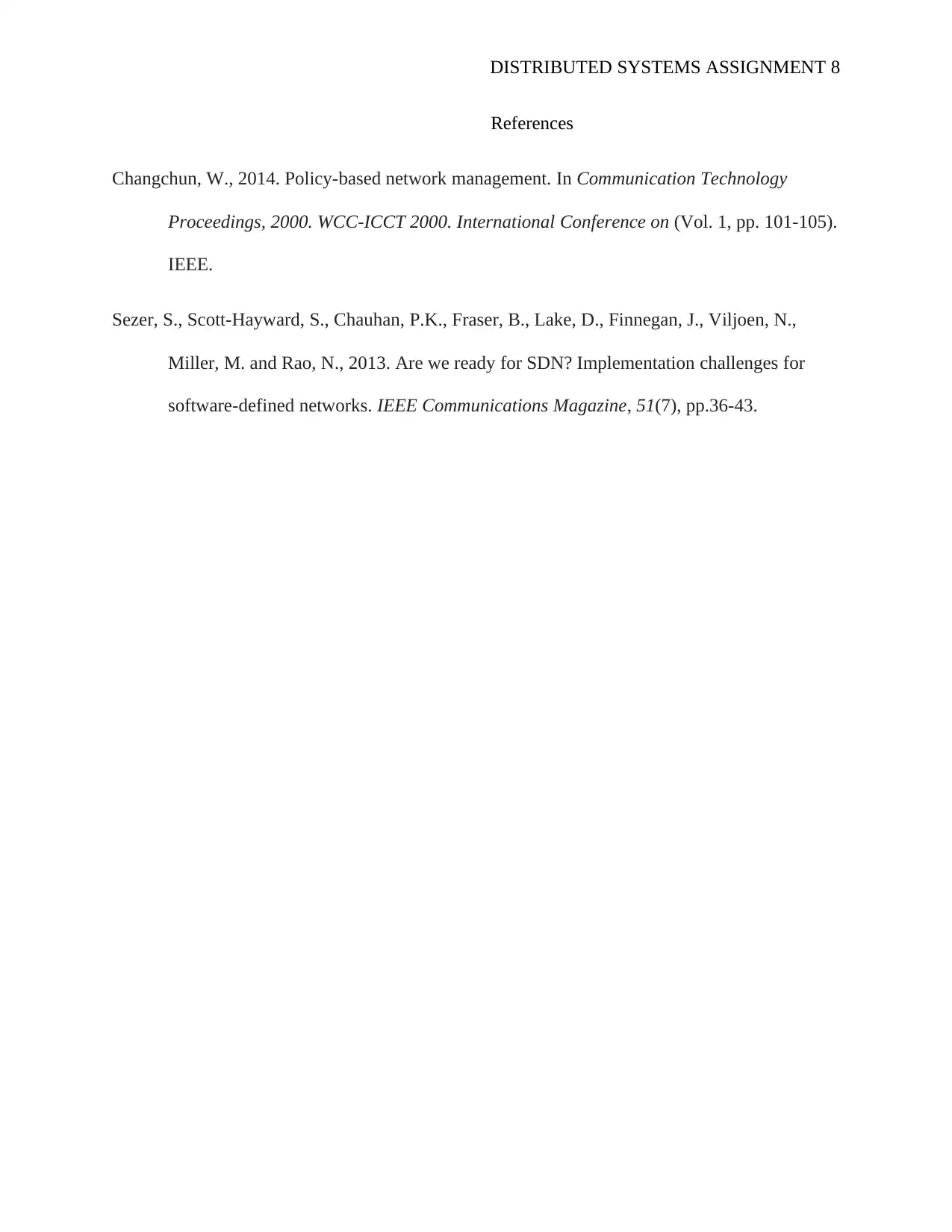
DISTRIBUTED SYSTEMS ASSIGNMENT 8
References
Changchun, W., 2014. Policy-based network management. In Communication Technology
Proceedings, 2000. WCC-ICCT 2000. International Conference on (Vol. 1, pp. 101-105).
IEEE.
Sezer, S., Scott-Hayward, S., Chauhan, P.K., Fraser, B., Lake, D., Finnegan, J., Viljoen, N.,
Miller, M. and Rao, N., 2013. Are we ready for SDN? Implementation challenges for
software-defined networks. IEEE Communications Magazine, 51(7), pp.36-43.
References
Changchun, W., 2014. Policy-based network management. In Communication Technology
Proceedings, 2000. WCC-ICCT 2000. International Conference on (Vol. 1, pp. 101-105).
IEEE.
Sezer, S., Scott-Hayward, S., Chauhan, P.K., Fraser, B., Lake, D., Finnegan, J., Viljoen, N.,
Miller, M. and Rao, N., 2013. Are we ready for SDN? Implementation challenges for
software-defined networks. IEEE Communications Magazine, 51(7), pp.36-43.
1 out of 8
Related Documents
Your All-in-One AI-Powered Toolkit for Academic Success.
+13062052269
info@desklib.com
Available 24*7 on WhatsApp / Email
![[object Object]](/_next/static/media/star-bottom.7253800d.svg)
Unlock your academic potential
© 2024 | Zucol Services PVT LTD | All rights reserved.





